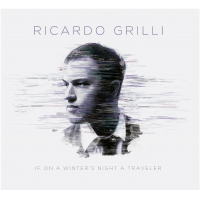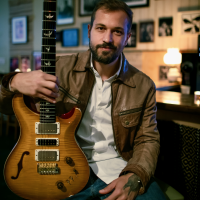Home » Jazz Musicians » Ricardo Grilli
Ricardo Grilli
It would be easy to assume, at least from a North American perspective, that any musically inclined kid growing up in Brazil has to come under the pervasive influence of Antonio Carlos Jobim and João Gilberto, Caetano Veloso and Gilberto Gil. But for São Paulo native Ricardo Grilli, who was born decades after the heydays of samba and Tropicalia, American and British rock bands mattered a lot more. A guitarist, he was especially taken with Dire Straits, whose timeless classic, “Sultans of Swing,” he played in various bands as a teenager.
And when Grilli, who is now 27, discovered jazz through friends and visits to the local record shop, it was not through the works of seminal mainstream artists such as Stan Getz, Jobim’s great American collaborator, but the groundbreaking jazz-rock of Miles Davis’s Bitches Brew. “I completely related to that big, chaotic sound—that aesthetic really appealed to me,” he said. In short order, the “children” of Bitches Brew—Weather Report, Return to Forever, the Mahavishnu Orchestra—captivated him as well.
Since then, Grilli has absorbed all kinds of influences, ranging from young guitar god Kurt Rosenwinkel to adventurous writer-arranger Maria Schneider. But one of the great strengths of his glowing debut album, If on a Winter’s Night a Traveler, is how subtly and seamlessly those influences come together in the service of Grilli’s restless creativity—manifested in his love of odd meters, offbeat structures, and themes that keep circling back on themselves like the narrative lines in the Italo Calvino novel from which Traveler takes its name.
Grilli began writing songs out of necessity while studying at the Berklee College of Music in Boston. “There was so much talent there, I felt a little lost,” he says. “I figured the best way to get people to play with me was to write interesting music they would want to play. And that worked.”
Among the Berklee classmates with whom he forged an especially tight bond was the brilliantly unpredictable pianist Christian Li, a native of the village of Horseheads in southwest New York State. He is featured on Traveler along with saxophonist Gustavo D’Amico, a friend of Grilli’s from Brazil, and the bass-drum team of Jared Henderson and Lee Fish, whom Grilli met at Wally’s Cafe, a Boston jazz club where they backed acclaimed young trumpeter Jason Palmer on weekends.
As a composer, Grilli uses a kind of free association method, starting out with a word or phrase
and seeing where it will take him musically. The germ for the wistful “Revolver” was a magazine
Read moreTags
Ricardo Grilli: 1954

by Jerome Wilson
Ricardo Grilli is a New York-based guitarist whose music is a gentle blend of jazz and progressive rock. He leads a quartet of accomplished musicians who know how to alternately be calm and spacious or rhythmic and grooving. On the calmer side “Rings" has a quietly throbbing beat and mellow texture set up by Joe Martin's bass and Eric Harland's simple drum patterns and “Breathe" is much the same but with a Latin tinge to the rhythm and delicate, lively ...
Continue ReadingGuitarist Ricardo Grilli Debuts Oct. 15 With "If On A Winter's Night A Traveler"

Source:
Terri Hinte Publicity
In the seven years since leaving his native São Paulo for Boston and then New York, guitarist Ricardo Grilli has found his voice as a distinctive jazz player and composer. His glowing debut album, If on a Winter’s Night a Traveler, which his Dark House label will release on October 15, chronicles that journey in rich detail. Grilli’s restless creativity is manifested in his love of odd meters, offbeat structures, and themes that keep circling back on themselves like the ...
read more
October 14, 2013 Brent Black Guitarist Ricardo Grilli allows you the freedom to dream with your eyes open... Brent Black / www.criticaljazz.com Books, film, and music are all vehicles for escape. The opportunity to take a cerebral journey through the eyes of another is the very life blood of the artist endeavor. If On A Winter's Night A Traveler is the auspicious debut from Brazilian Ricardo Grilli that takes the listener on a somewhat conceptualized journey through his experience drawn from a variety of mediums as they relate to his travel from his native Sao Paulo to New York. Ricardo Grilli has a creative jones not shackled by the conventional form and function of improvisational music
Primary Instrument
Guitar
Location
New York City
Willing to teach
Advanced only
Credentials/Background
New York University - Adjunct Guitar Instructor Private Lessons - Email to schedule.
George Benson
guitarKurt Rosenwinkel
guitarPeter Bernstein
guitarJohn Coltrane
saxophoneDave Holland
bassWayne Krantz
guitar, electricChris Potter
saxophone, tenorEric Harland
drumsJulian Lage
guitar, electricJimmy Herring
guitarPhotos
Music
Recordings: As Leader | As Sideperson




















